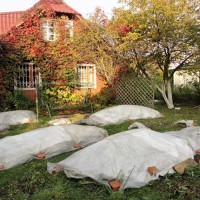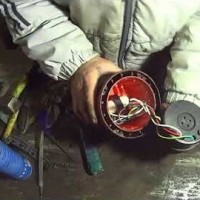The gas tank is frozen: common causes and ways to quickly fix the problem
Almost every user of a gas tank or gas cylinder is familiar with the situation when the gas in the tank itself freezes in winter or the reducer stops working due to low temperatures. You have to quickly fix the problem, especially if this is the only fuel source in your home. But, you must agree that it would be much more reasonable to understand the causes of this phenomenon and eliminate the freezing of the gas tank than to try to deal with the consequences every winter.
When a gas tank or its gearbox is frozen, leaving everything to chance is not the best solution. In severe frosts, there is a high probability of being without heating. If you follow our advice below, you will be able to choose the optimal gearbox, properly insulate the entire system and make it more reliable.
But before that, it’s worth understanding the very problem of freezing gas containers, namely, why this happens and how to prevent this process. We investigated this problem and found several reasons for this, as well as ways to eliminate them.
The content of the article:
Reasons for gas freezing in gas tanks
The situation when gas freezes in a gas holder will not surprise many users of this device. Everything is connected with the properties of liquefied hydrocarbon gases (hereinafter referred to as LPG).As soon as they are pumped into a gas tank, they change their state of aggregation under high pressure and partially turn into a liquid, and partially remain in gaseous form.
LPG consists of a mixture of hydrocarbon gases, usually propane and butane, which have different physical characteristics. Thus, in the warm season, more butane is observed in the area of the gas tank neck, the active evaporation of which occurs at temperatures above -0.5°C. In winter, butane, on the contrary, becomes more liquid and is located at the bottom of the container.
Read about the difference between winter gas and summer gas in this material.
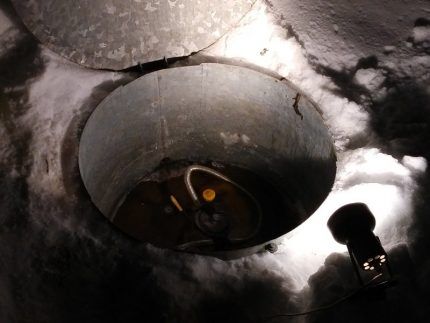
Based on this, several conclusions can be drawn:
- The gas mixture for use in summer and winter should be different. The optimal ratio for winter is at least 80% propane and 20% butane.
- To prevent the gas tank from freezing, it is recommended to install it underground, at a depth of at least 1 meter from the surface.
- Must be observed rules for installing gas tanks.
If you follow these simple rules, the likelihood of a gas container freezing will be significantly reduced.
Operating principle of the gearbox
To supply gas to private houses, gas tanks are often used, the pressure inside of which is quite high, but it is not suitable for supplying gas to the house. Therefore, to reduce it, it is used gearbox. It has a special design that reduces the LPG pressure to controlled values.
The reducer works as follows: a special valve, which is connected to a flexible membrane, periodically opens and closes.Due to the difference in pressure between the lower and upper chambers, the membrane comes into action and passes gas at the desired speed.
Residents of country houses often encounter a problem when the gas tank reducer freezes, and this happens quite often, especially in winter. How efficient will the system be in this case and how can it be repaired?
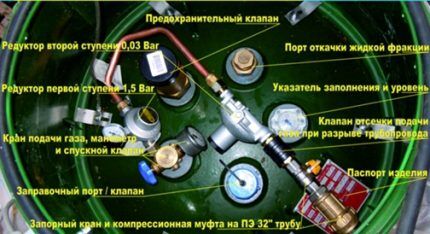
It is important to install a protective cover over the gearbox or cover it with moisture-resistant materials to prevent moisture accumulation and avoid the problem of freezing of the device.
How to avoid gearbox freezing?
There are several ways to avoid freezing. For example, you can build a special shelter over this element of the gas tank to protect the device from moisture getting into it.
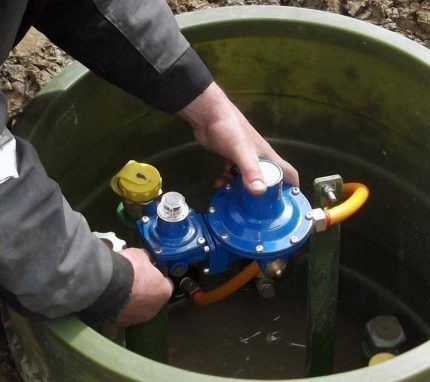
The second way to avoid the problem of gearbox freezing is to choose a high-quality device. Most freeze in winter even without moisture getting inside. They have to be insulated or warmed up.
If you purchase a good gas supply regulator, it will be able to operate stably and produce the required output pressure even in the most severe frosts. For example, the best sellers among gearboxes for gas tanks are devices from Rego and Gok. Choose gearboxes with high pipes to reduce the likelihood of them freezing.
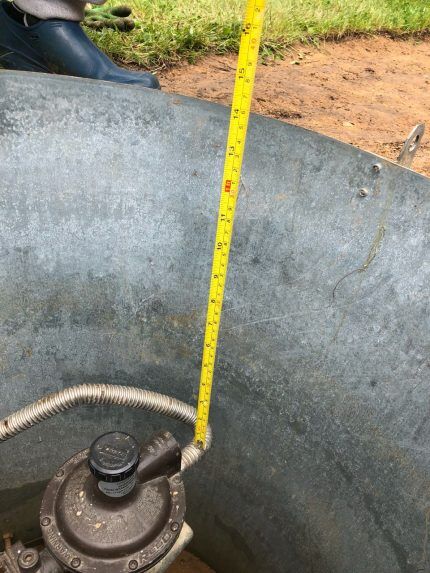
The best option is to purchase expensive equipment and build a special electrically heated shelter for it. This solution will maximize the life of the gas tank with a reducer and avoid problems with its use.
Other options to avoid gearbox freezing:
- install a gas tank with a high neck;
- purchase a device with a multi-valve and high pipes. Here it is also important to install it correctly so that the pipes are not planted deep into the ground;
- purchase a waterproof gearbox in which the breathing valves have high nozzles;
- use only high quality fuel.
If you see problems in the operation of your gearbox, it is better to disassemble it and fix all the problems before it freezes, since then it will be much more difficult to warm it up.
Regular device maintenance
Often, moisture in the reducer appears during the endothermic process of gas evaporation (heat is absorbed in the gas tank and reducer, they become very cold, and condensation appears on their surface); it can accumulate even during the construction of all kinds of shelters.
Therefore, it is important to periodically carry out preventive maintenance of the device - remove it from the gas tank and clean and dry it. You can do this yourself, or you can invite a specialist who will disassemble it, clean it from dirt and dust, replace a worn membrane or spring, and, if necessary, adjust the pressure.
A way to quickly warm up the gearbox
If an emergency has already occurred and the gearbox is frozen, you can pour boiling water over it. It is strictly forbidden to heat the device with an open flame or with devices with a spiral, for example, a hair dryer. This may cause the gas mixture to ignite.
Simple heating cable and other electrical appliances are also not recommended for use, since in the event of a short circuit, a spark may occur, which can cause a subsequent gas explosion in the gas tank.
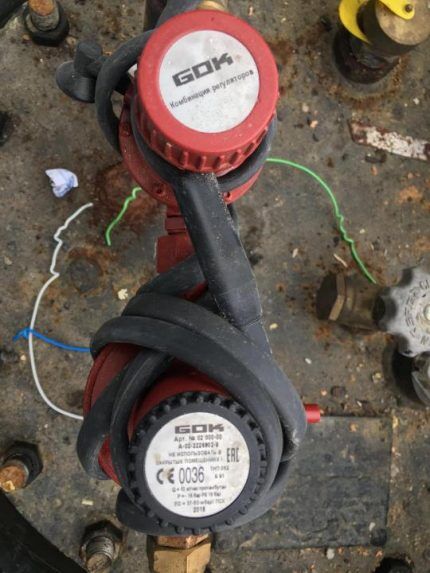
You can determine whether the reducer is frozen if the gas pressure at the outlet is too unstable. It may be absent, sharply increase or decrease during stable operation of the boiler. If you observe at least one of these problems, you should contact a specialist.
Gearbox heating kit
The method of using boiling water to warm the gearbox, as a rule, helps for a short time, so if you have professional skills that allow you to repair the gearbox yourself, we recommend purchasing:
- safe heating electric cable;
- heat-insulating shell for placing the gearbox in it;
- plug 2 meters from the gas tank.
You can install this kit yourself if you have experience working with gas equipment, but if you don’t have such experience, you should contact a specialist. After all, any careless movement can “finish off” the gearbox membrane, which is already damaged by ice.
What to do if the gas tank itself freezes?
Although the main reason for the lack of gas supply from the gas tank is the freezing of the reducer, sometimes the tank itself can freeze.So, the water on the site can be in such quantity that it can flood the gas tank and freeze it with the arrival of frost. And a situation arises when there is still gas in the container, but it does not come out.
The second reason for freezing of a gas tank is the consumption of propane from LPG and the remainder inside only butane and water condensate, which freeze easily.
It is important to insulate the gas tank, since in severe frosts any LPG will freeze. For example, pure propane in a liquefied state can freeze already at -15 ° C. This leads to a fall pressure in gas pipes, malfunction of the boiler and other problems.
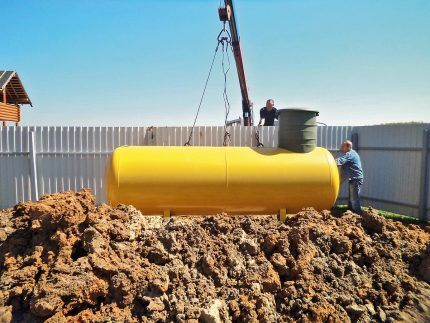
In such cases, users have only one question: how much is it permissible to use heating to restore the operation of the gas tank? The easiest way is to pour boiling water over the gearbox and part of the container near it. This will allow you to warm up the neck itself, where the gaseous product should form. But it is much more important to install the gas tank correctly and connect reliable equipment to it.
So, if the container is installed too close to the surface of the earth or even stands on it, then the balance of propane and butane in the mixture will quickly deteriorate. Propane will evaporate even at the lowest temperature, leaving butane in the container. This gas is much more prone to freezing and often creates a blockage in the pipe, leading to a drop in pressure. The optimal ratio of propane and butane should be at least 75:25, and preferably 80:20.
Options for insulating a gas tank
Owners of houses that are heated exclusively using an autonomous gas supply often think about additional insulation. This is especially true for residents of the northern regions, where the operation of a gas tank is complicated by very severe frosts. But how effective can insulation be with standard insulation, for example, polystyrene foam, for the operation of a gas holder?
As mentioned, butane freezes quite naturally at extremely low temperatures. In view of this, in the northern part of the country, people do not rely on the quality of the winter gas mixture, where there is more propane, but prefer to insulate the container with heat-insulating materials, for example, extruded polystyrene foam.
In those regions where severe frosts do not occur, it is enough that the gas tank is installed at depth, and on top it is protected by a layer of snow, which does not allow cold air below to pass through.
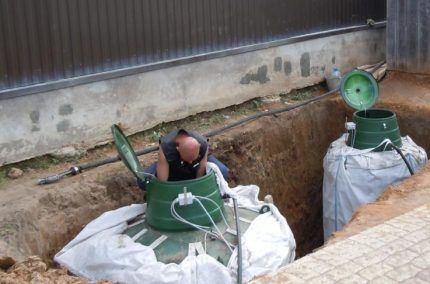
As insulation, it is best to use polystyrene foam, both sheets and crumbs, mineral wool, penofol, expanded polystyrene. Their number should depend both on the lowest air temperature in the region and on the depth of the gas tank.
If it was decided to insulate the gas tank, use the following expert advice:
- install insulation on the top of the container;
- carefully cover the neck and lid with heat-insulating material;
- make a high-quality shelter for the gearbox.
Some try to connect a pipe from a heated floor to the reducer and maintain a temperature of about 30 degrees in it.
But not all engineers approve of this solution, so consult with specialists before implementing it. But never connect an electrical cable to a gas container.
Conclusions and useful video on the topic
Below, in several videos, you can get detailed information about the reasons for freezing of the gas tank reducer and how to defrost it, as well as how to choose the right gas tank itself.
Principles for the correct selection of a gas tank and its installation on the site:
The main reasons for freezing of the gas tank reducer and ways to eliminate them:
So, freezing of the gas tank reducer and even the tank itself is a common occurrence in winter. The choice of an unsuccessful gas mixture, the use of cheap equipment, the lack of timely preventive maintenance for the gearbox - all this leads to emergency situations.
To fix the problem, it is recommended to contact specialists who will carefully defrost the gas tank and resume its operation. In the future, it is worth thinking about insulating the entire system so that such situations do not recur.
If you have encountered the problem of a gas tank or its reducer freezing on your site or have professional knowledge in this area, leave your comments, ask questions, and share your own experience.
